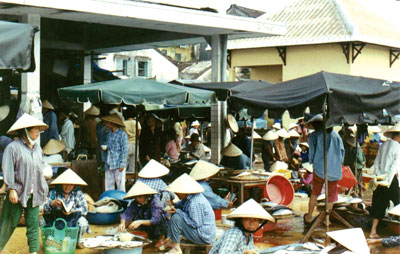Vietnam, Sri Lanka: A lasting bond of friendship
Sri Lankan's ambassador to Vietnam, Aparekka
Ratnapala, spoke to Vietnam News on the occasion of Sri Lanka's National
Day.
|

Ambassador Ratnapala.
|
Q: Could you give us some background information about Sri
Lanka?
A: Sri Lanka is a free, independent and sovereign nation.
Legislative power is exercised by a Parliament elected by the people on
a proportionally representative basis.
The executive power of the people, including defence, is exercised by
the President, who is also elected by the people.
The people of Sri Lanka are of diverse ethnicities and faiths. The
country is an ancient centre of Buddhist religion and culture. The
ethnic majority are the Sinhalese, who are mostly Buddhists, and
minorities include Tamils, Moors and Burghers.
Sri Lanka has an export-oriented economy with a widely expanding
service sector. Tea, rubber and coconut are important export
agricultural crops, with tea being a major foreign exchange earner.
Other crops of importance are cocoa and spices such as cinnamon,
cardamom, pepper and cloves.
The Government encourages foreign investment in diverse areas, such
as banking, finance, telecommunication, energy, information technology,
electronics assembly, light engineering, automobile parts and
accessories manufacturing, tourism, mining, agriculture and
agro-processing, gems and jewellery, healthcare and pharmaceuticals,
port-related services, and infrastructure projects.
The Constitution of Sri Lanka guarantees the protection of foreign
investment. Sri Lanka continues its efforts to introduce maximum and
effective devolution of power to the provinces to meet the aspirations
of the minorities, including the Tamil speaking peoples, as well as
other communities, especially those living in the North and East.
|

The Vietnamese are a resourceful people |
The Government has emphasised the fact that the task of finding a
political solution to the conflict in the Northern and Eastern provinces
requires a multi-party effort and inclusive approach.
This involved the formation of the All Party Representative Committee
(APRC) and the appointment of a Panel of Experts in the hope of reaching
a national consensus among political parties.
It is the firm conviction of the government of the President that the
conflict in Northern and Eastern provinces cannot be solved through
military means alone.
The Government is fully committed to finding a lasting negotiated
political settlement to this conflict. The proposals for the political
settlement have been submitted by the All Party Representative Committee
(APRC).
Today, the Government has been compelled to take military action
against the terrorism of the Liberation Tigers of Tamil Eelam (LTTE),
and the current military approach towards finding a solution to the
conflict is directed at protecting our civilians.
Q: How has the long-lasting conflict between the Sri Lankan
Government and Tigers impacted Sri Lanka's socio - economic development?
A: The number of countries that have suffered from terrorism
in recent times is very high. At a time when the world is witnessing
unprecedented economic progress, some societies are held back by the
cruelty of terrorism. Among these cases, Sri Lanka is no exception: the
country has been a victim of the terrorism of the Tigers for over two
decades.
Sri Lanka's economic growth rate reached around 6.7 per cent by the
end of last year. Exports increased by 11 per cent. Foreign direct
investment doubled. Unemployment reached an all time low and reserves
expanded.
This performance would have reached more impressive figures still
were it not for the negative perceptions of Sri Lanka's investment
environment generated by the LTTE's terrorism.
Economic growth by the end of the last year was supported by all
three sectors, with the industrial sector the main driving force in the
economy.
Last year, cumulative export earnings reached US$6.877 billion,
growing by 11 per cent. The cumulative expenditure on imports recorded
an increase of around 8 per cent year-on-year in 2007 and amounted to
$10.142 billion.
International oil prices, which hit a record above $95 a barrel in
November, was a major contributor to higher imports.
Industrial exports grew, with exports of textiles and garments
constituting 40 per cent of the total exports. Other industrial exports
registering year-on-year increases included: machinery and equipment;
rubber based products; food, beverages and tobacco; and diamonds and
jewellery. Agricultural exports accounted for 22 per cent of the total
exports.
Foreign investment in the country continued to increase,
demonstrating the better performance of the Sri Lankan corporate sector
in an environment of ever-higher economic growth.
Since national independence the Government has given the highest
priority to education, providing free education to all children from
kindergarten through university.
The Government also spends a huge sum of funds to provide equitable
health facilities for all, securing free health services in all
hospitals throughout the country irrespective of social class, economic
condition, religion and ethnic origin.
Sri Lanka's tourism industry is a major foreign exchange earner for
the island's economy. Despite the insurgency in the north, Sri Lanka
attracts thousands of visitors each year from around the world.
Q: How would you describe the course of the relationship
between Vietnam and Sri Lanka ? What areas should the two countries
promote in the future ?
A: Sri Lanka-Vietnam relations have roots in the two
countries' affinity to Buddhism and were nurtured by the solidarity of
Sri Lanka during Vietnam's struggle against colonialism.
Sri Lanka has firmly favoured Vietnam during the Vietnamese struggle
for freedom and also recognised the Revolutionary Government of the
Republic of Southern Vietnam. Later, following re-unification, Sri Lanka
was one of the first countries to establish relations with Vietnam.
Since the establishment of diplomatic ties in 1970, Sri Lanka and
Vietnam have signed a number of agreements and MoUs in many fields for
co-operation between the two countries and exchanged high-level visits.
The two countries have supported and co-operated with one another at
many a multilateral forum.
Vietnam has benefited from the South-South Technical Co-operation
Programme of the Ministry of Foreign Affairs of Sri Lanka, introduced in
2001, and a considerable number of Vietnamese nationals continue to
undergo training and skill development programmes in selected centres of
educational excellence in Sri Lanka.
There are also a considerable number of Sri Lankans living and
working in Vietnam, mostly professionals attached to multinational
organisations, in the hospitality sector, etc. Several Sri Lankan
companies have investments in industries ranging from garments and
textiles to desiccated coconuts as well as facets of the service sector
such as shipping.
Bilateral trade relations between Sri Lanka and Vietnam continue to
register a steady growth, especially following the opening of the
Vietnamese economy and the Vietnamese admission into the World Trade
Organisation (WTO) in November 2006.
Potential for further expansion of trade, investments and tourism
between the two countries is growing and the business communities of
both countries should make use of these opportunities.
Sri Lanka's current exports to Vietnam include diamonds, dyed and
crocheted fabrics, natural rubber and non-cellular rubber, tea, textile
materials, knitted and crocheted synthetic fabrics, apparel and clothing
accessories.
Imports from Vietnam include processed agricultural products,
reception instruments for television, tractors and other agricultural
machinery, cotton, marble, synthetic staple fibres, glazed ceramic
flags, paving and wall tiles, acyclic hydrocarbons, active yeast,
synthetic filaments, herbicides, anti-fungal products, and natural
rubber. The two-way trade between Sri Lanka and Vietnam at present is
$40 million and the potential for an increase remains untapped.
There are opportunities for Sri Lanka's business community in the
promotion of intermediate goods for industries such as construction,
hospitality, plantations and garments.
Sri Lanka could also offer consultancy/professional services in the
fields of engineering, architecture, construction, hotel management and
business management.
The export market for consumable products such as confectioneries,
tea and other beverages including herbal drinks, cosmetics, rubber
products, and gems and jewellery are also growing as a result of the
rising purchasing power among the 83 million-strong Vietnamese
population due to fast economic growth. Currently, Sri Lanka enjoys
favourable import duties for Sri Lankan products as Vietnam extends MFN
status to Sri Lanka.
These opportunities have to be explored by the business community of
both countries. |

